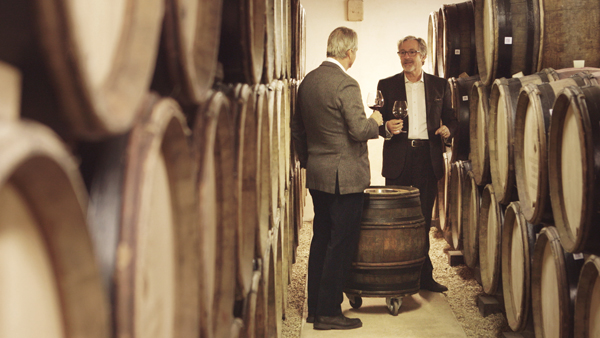Rudy Kurniawan cultivated the image of an expert collector of wine during the early 2000s, when it was viewed as an investment opportunity as much as a beverage. He infiltrated the mostly older, white, and wealthy wine collecting scenes in Southern California and, thanks to his sophisticated palette and breadth of knowledge, Kurniawan’s mythical status only grew after he began purchasing huge lots at auction. He went on to enjoy the camaraderie of major collectors, auction directors, and other key figures.
But he was also a man of some shady secrets, the repercussions of which would be felt by wine speculators everywhere once brought to light. Sour Grapes, directed by Jerry Rothwell and Reuben Atlas, chronicles Kurniawan’s rise and fall, albeit without his active participation. Instead, it relies on footage from social events Kurniawan attended during his decade-long heyday, back when he had convinced a lot of deep-pocketed wine lovers that he was a trust fund brat descended from a rich Indonesian family with limitless resources. Through Acker Merrall & Condit, a wine auction house, lots purportedly from Kurniawan’s personal collection hit the auction block and were sold for millions of dollars. However, some of the wines turned out to be counterfeit, and parties ranging from rival collectors to wine producers, and even the FBI, began zeroing in on him.
Through it all, the affable if charisma-challenged fraudster comes across as less a criminal mastermind than as an opportunist who found the right hustle at the right time. As one of interviewees points out, wine speculation at the time was an unregulated activity. There was only the word of the lot owner and the auction house to guarantee the product was as advertised, and in this case there was a conflict of interest since Kurniawan was friends with an Acker Merrall executive.
As for the victims, they mostly consisted of the well-to-do, including a set of filmmakers and other Hollywood players who dubbed themselves the “Angry Men.” They don’t come across as having enough insight to have ever caught on to Kurniawan, who had sold them some fakes, and indeed, they seem more interested in using wine as an excuse to gather socially and yell at one another. (This is not to say the filmmakers view Kurniawan’s counterfeiting to have been a victimless crime.)
If any hero is to be found in the narrative, it’s outsiders to the speculative wine scene, such as Laurent Ponsot, a vintner at Domaine Ponsot and a descendant of its founding family. Upon discovering fakes of their Burgundy in an auction catalog, he crosses the Atlantic to personally demand it be removed from bidding. The viewer gets the sense that Ponsot is a traditional hero with emphasis on “tradition”; the film opens with him narrating about how wine is a living thing, his voice dubbed over shots of his vineyards. His passion is a sharp contrast to the party atmosphere of a wine auction, in which the vino seems like an afterthought.
Another hero, FBI agent Jim Wynne, admits to being a novice on wine, yet he’s savvy enough to follow the proverbial money, leading to intriguing revelations about Kurniawan’s family ties. Wynne is one of several good detectives in what gradually feels more like a crime procedural than a film about wine, though it’s livelier than most examples of the former. The film repeatedly comes back to the aforementioned “Angry Men,” one of whom claims Kurniawan did not rip him off every time. He eventually pours what he believes to be an especially costly vintage to the other club members, a gesture that ends as it must—with a loud argument about its authenticity and quality.
But beyond its primary story, what makes the film especially fascinating are the details about the speculative wine scene, which blew up during the late 1990s, when those who attained their wealth during the dot-com boom needed something else to throw their money into. In wine, human greed found an unregulated commodity and a means of garnering huge returns. It also paved the way for opportunists to abuse the system for their own gain. Years later, it was credit default swaps—a different vintage, and a bigger hangover, too.
Sour Grapes screens as part of DOC NYC on November 14th and November 17th.

















Leave A Comment